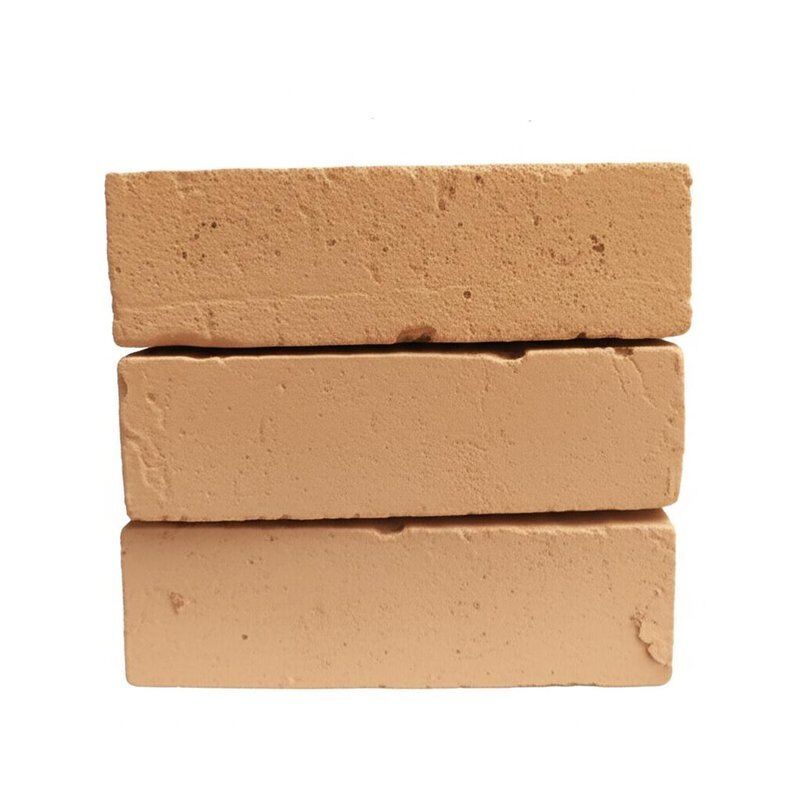পণ্যের বর্ণনা:
রিফ্র্যাক্টরি ক্লে ব্রিকস, যা ক্লে ফায়ারব্রিক বা ক্লে ফার্নেস ব্রিকস নামেও পরিচিত, উচ্চ-তাপমাত্রা শিল্প অ্যাপ্লিকেশনগুলিতে, বিশেষ করে রিহিটিং ফার্নেসে অপরিহার্য উপাদান। এই ইটগুলি চরম তাপীয় পরিস্থিতি সহ্য করার জন্য বিশেষভাবে ডিজাইন করা হয়েছে, সেইসাথে কাঠামোগত অখণ্ডতা এবং কর্মক্ষমতা বজায় রাখে, যা তাদের বিভিন্ন ধাতুবিদ্যা প্রক্রিয়াকরণে ফার্নেস লাইনারের জন্য আদর্শ করে তোলে।
এই ক্লে রিফ্র্যাক্টরি ব্রিকগুলির প্রধান অ্যাপ্লিকেশনগুলির মধ্যে একটি হল রিহিটিং ফার্নেসগুলিতে, যেখানে তারা একটি টেকসই এবং নির্ভরযোগ্য আস্তরণ সরবরাহ করে যা উচ্চ তাপমাত্রার ক্রমাগত এক্সপোজার সহ্য করতে পারে। এই ইটগুলির অনন্য রাসায়নিক গঠন তাদের কর্মক্ষমতায় একটি গুরুত্বপূর্ণ ভূমিকা পালন করে। সাধারণত, ইটগুলিতে 30-45% অ্যালুমিনা (Al2O3), 50-65% সিলিকা (SiO2), এবং 2%-এর কম আয়রন অক্সাইড (Fe2O3) থাকে। এই সুষম রাসায়নিক গঠন তাপীয় চাপ এবং রাসায়নিক আক্রমণের বিরুদ্ধে চমৎকার প্রতিরোধ ক্ষমতা নিশ্চিত করে, যা ফার্নেস পরিবেশে সাধারণ চ্যালেঞ্জ।
এই ক্লে ফার্নেস ব্রিকগুলির ফাটল প্রতিরোধের মডুলাস 70 থেকে 80 এর মধ্যে, যা তাদের চিত্তাকর্ষক যান্ত্রিক শক্তি নির্দেশ করে। এই বৈশিষ্ট্যটি অত্যন্ত গুরুত্বপূর্ণ কারণ এটি ইটগুলিকে যান্ত্রিক লোড এবং তাপীয় চক্রের অধীনে বিকৃতি এবং ফাটল প্রতিরোধ করতে দেয়, যার ফলে ফার্নেস আস্তরণের জীবনকাল বৃদ্ধি পায়। উচ্চ ফাটল প্রতিরোধের মডুলাস ফার্নেস অপারেশনের সামগ্রিক নিরাপত্তা এবং দক্ষতায় অবদান রাখে।
তাপীয় শক প্রতিরোধ ক্ষমতা এই ক্লে ফায়ারব্রিক পণ্যগুলির আরেকটি গুরুত্বপূর্ণ বৈশিষ্ট্য। ফাটল বা স্প্যালিং ছাড়াই দ্রুত তাপমাত্রা পরিবর্তন সহ্য করার ক্ষমতার কারণে, এগুলি ঘন ঘন গরম এবং শীতল চক্র জড়িত অ্যাপ্লিকেশনগুলির জন্য অত্যন্ত উপযুক্ত। এই বৈশিষ্ট্য রক্ষণাবেক্ষণ ডাউনটাইম হ্রাস করে এবং অবিচ্ছিন্ন অপারেশন নিশ্চিত করে, যা শিল্প ব্যবহারকারীদের জন্য অর্থনৈতিকভাবে উপকারী।
ব্যবহারের ক্ষেত্রে, এই ক্লে রিফ্র্যাক্টরি ব্রিকগুলি প্রধানত ফার্নেস লাইনার হিসাবে ব্যবহৃত হয়। তাদের শক্তিশালী নির্মাণ এবং তাপীয় বৈশিষ্ট্য স্থিতিশীল অভ্যন্তরীণ তাপমাত্রা বজায় রাখতে, তাপের ক্ষতি থেকে ফার্নেস শেলকে রক্ষা করতে এবং শক্তি দক্ষতা উন্নত করতে সহায়তা করে। তাপের ক্ষতি এবং রাসায়নিক অবনতির বিরুদ্ধে একটি নির্ভরযোগ্য বাধা প্রদান করে, এই ইটগুলি রিহিটিং ফার্নেসের কার্যকরী কার্যকারিতা এবং দীর্ঘায়ুতে উল্লেখযোগ্যভাবে অবদান রাখে।
আরও, এই ক্লে রিফ্র্যাক্টরি ব্রিকগুলির উত্পাদন প্রক্রিয়া সুসংগত গুণমান এবং মাত্রিক নির্ভুলতা নিশ্চিত করে, যা শক্তভাবে লাগানো ফার্নেস আস্তরণ নির্মাণের জন্য অপরিহার্য। এই নির্ভুলতা ফাঁক এবং দুর্বল পয়েন্টগুলি হ্রাস করে, ফার্নেসের সামগ্রিক তাপ নিরোধক এবং কাঠামোগত স্থিতিশীলতা বৃদ্ধি করে।
সংক্ষেপে, রিফ্র্যাক্টরি ক্লে ব্রিকস, ক্লে ফায়ারব্রিক, এবং ক্লে ফার্নেস ব্রিকস রাসায়নিক স্থিতিস্থাপকতা, যান্ত্রিক শক্তি এবং চমৎকার তাপীয় শক প্রতিরোধের একটি সমন্বয় প্রদান করে। রিহিটিং ফার্নেস লাইনারগুলিতে তাদের প্রয়োগ তাদের শিল্পে অপরিহার্য করে তোলে যার জন্য নির্ভরযোগ্য উচ্চ-তাপমাত্রা উপকরণ প্রয়োজন। তাদের সর্বোত্তম রাসায়নিক গঠন, উচ্চ ফাটল প্রতিরোধের মডুলাস, এবং উচ্চতর তাপীয় শক প্রতিরোধের সাথে, এই ইটগুলি দক্ষ ফার্নেস অপারেশন, হ্রাসকৃত রক্ষণাবেক্ষণ এবং দীর্ঘায়িত পরিষেবা জীবন নিশ্চিত করে।
বৈশিষ্ট্য:
-
পণ্যের নাম: ক্লে রিফ্র্যাক্টরি ব্রিক
-
রাসায়নিক গঠন: Al2O3 30-45%, SiO2 50-65%, Fe2O3 2%-এর কম
-
ক্রিপ হার: ≥1350℃
-
কোল্ড ক্রাশিং স্ট্রেন্থ: 20-40 MPa
-
আকৃতি: ব্রিক
-
অ্যাপ্লিকেশন: রিহিটিং ফার্নেসে ব্যবহারের জন্য উপযুক্ত
-
উচ্চ অ্যালুমিনা ক্লে ব্রিক চমৎকার তাপ প্রতিরোধের প্রস্তাব করে
-
উচ্চ-তাপমাত্রা পরিবেশের জন্য ডিজাইন করা টেকসই রিফ্র্যাক্টরি ক্লে ব্রিকস
-
উচ্চতর যান্ত্রিক শক্তি এবং তাপীয় স্থিতিশীলতা সহ ক্লে ফায়ারব্রিক
প্রযুক্তিগত পরামিতি:
|
তাপীয় শক প্রতিরোধ
|
ভালো
|
|
ব্যবহার
|
ফার্নেস লাইনার
|
|
কোল্ড ক্রাশিং স্ট্রেন্থ
|
20-40 MPa
|
|
অ্যাসিড প্রতিরোধ
|
চমৎকার
|
|
বাল্ক ঘনত্ব
|
2.1-2.2
|
|
Ccs
|
≥40 MPa
|
|
অ্যাপ্লিকেশন
|
রিহিটিং ফার্নেস
|
|
আকৃতি
|
ব্রিক
|
|
উৎপত্তি
|
চীন
|
|
স্ট্যান্ডার্ড সাইজ
|
230*114*73 মিমি
|
অ্যাপ্লিকেশন:
ANNEC ক্লে রিফ্র্যাক্টরি ব্রিক, নির্ভুলতার সাথে তৈরি এবং ISO সার্টিফিকেশন দ্বারা সমর্থিত, চীন থেকে উৎপন্ন একটি উচ্চ-মানের পণ্য। 2.1-2.2 এর বাল্ক ঘনত্ব এবং ≥1350℃ এর ক্রিপ হার সহ ডিজাইন করা হয়েছে, এই ইটগুলি চরম তাপমাত্রা এবং যান্ত্রিক চাপ সহ্য করার জন্য প্রকৌশলী। 230*114*73 মিমি এর স্ট্যান্ডার্ড সাইজ এবং 70 থেকে 80 পর্যন্ত ফাটল প্রতিরোধের মডুলাস তাদের বিভিন্ন শিল্প অ্যাপ্লিকেশনের জন্য আদর্শ করে তোলে যা স্থায়িত্ব এবং নির্ভরযোগ্যতার দাবি করে।
এই ক্লে ফার্নেস ব্রিকগুলি উচ্চ-তাপমাত্রা ফার্নেস, কিলন এবং অগ্নিকুণ্ডের নির্মাণ ও রক্ষণাবেক্ষণে ব্যাপকভাবে ব্যবহৃত হয়। তাদের চমৎকার তাপ প্রতিরোধের এবং যান্ত্রিক শক্তি নিশ্চিত করে যে তারা শিল্প ফার্নেসের অভ্যন্তরের কঠোর পরিস্থিতি সহ্য করতে পারে, যা তাদের ইস্পাত, কাচ, সিমেন্ট এবং সিরামিক শিল্পের জন্য একটি পছন্দের পছন্দ করে তোলে। ক্লে ফার্নেস ব্রিকগুলিতে উচ্চ অ্যালুমিনা উপাদান তাদের রিফ্র্যাক্টোরিনেস এবং স্ল্যাগ ক্ষয় প্রতিরোধের ক্ষমতা বাড়ায়, যা দীর্ঘমেয়াদী অপারেশনাল সময়কালে ফার্নেসের অখণ্ডতা বজায় রাখার জন্য গুরুত্বপূর্ণ।
ধাতুবিদ্যায়, ANNEC উচ্চ অ্যালুমিনা ক্লে ব্রিক ব্লাস্ট ফার্নেস, রিহিটিং ফার্নেস এবং অন্যান্য তাপ-নিবিড় পরিবেশের আস্তরণের জন্য অপরিহার্য। তাদের কাস্টমাইজড মডেল বিকল্পগুলি নির্দিষ্ট ফার্নেস ডিজাইনগুলির সাথে মানানসই করার জন্য তৈরি সমাধানগুলির অনুমতি দেয়, যা শক্তি দক্ষতা এবং অপারেশনাল নিরাপত্তা উন্নত করে। এই রিফ্র্যাক্টরি ইটগুলি পাওয়ার প্ল্যান্ট এবং ইনসিনারেশনগুলিতেও উল্লেখযোগ্য ব্যবহার খুঁজে পায়, যেখানে উচ্চ তাপমাত্রায় ধারাবাহিক কর্মক্ষমতা অত্যন্ত গুরুত্বপূর্ণ।
তদুপরি, ANNEC ক্লে রিফ্র্যাক্টরি ব্রিক এমন পরিস্থিতিতে আদর্শ যেখানে তাপীয় শক প্রতিরোধ ক্ষমতা এবং যান্ত্রিক স্থিতিশীলতা প্রয়োজন। তাদের শক্তিশালী কাঠামো তাদের চক্রীয় গরম এবং শীতল করার পরিস্থিতিতে ভাল পারফর্ম করতে দেয়, যা রক্ষণাবেক্ষণ খরচ এবং ডাউনটাইম হ্রাস করে। এটি তাদের পেট্রোকেমিক্যাল প্ল্যান্ট এবং সিমেন্ট রোটারি কিলনগুলিতে অ্যাপ্লিকেশনগুলির জন্য উপযুক্ত করে তোলে, যেখানে অপারেশনাল নির্ভরযোগ্যতা সর্বাপেক্ষা গুরুত্বপূর্ণ।
সামগ্রিকভাবে, ANNEC-এর ক্লে ফার্নেস ব্রিকস এবং উচ্চ অ্যালুমিনা ক্লে ব্রিক পণ্যগুলি শিল্পে বহুমুখী এবং অপরিহার্য উপকরণ যা উচ্চ-কার্যকারিতা রিফ্র্যাক্টরি সমাধানগুলির প্রয়োজন। চীন থেকে তাদের উৎপত্তি, ISO সার্টিফিকেশন এবং কাস্টমাইজযোগ্য স্পেসিফিকেশনগুলির সাথে মিলিত, নিশ্চিত করে যে গ্রাহকরা তাদের নির্দিষ্ট শিল্প চাহিদার জন্য তৈরি টেকসই, দক্ষ এবং সাশ্রয়ী রিফ্র্যাক্টরি ইট পান।

 আপনার বার্তাটি 20-3,000 টির মধ্যে হতে হবে!
আপনার বার্তাটি 20-3,000 টির মধ্যে হতে হবে! অনুগ্রহপূর্বক আপনার ইমেইল চেক করুন!
অনুগ্রহপূর্বক আপনার ইমেইল চেক করুন!  আপনার বার্তাটি 20-3,000 টির মধ্যে হতে হবে!
আপনার বার্তাটি 20-3,000 টির মধ্যে হতে হবে! অনুগ্রহপূর্বক আপনার ইমেইল চেক করুন!
অনুগ্রহপূর্বক আপনার ইমেইল চেক করুন! 
